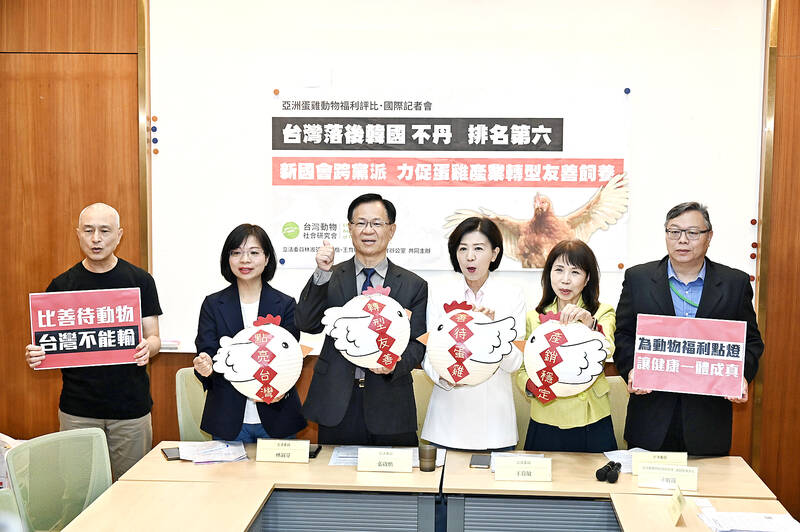Lawmakers and activists on Thursday urged the government to support a transition to cage-free chicken farming after Taiwan ranked sixth out of 17 countries in Asia in an independent report that evaluated countries on the progress made toward abolishing battery cages.
The Asia Cage-Free Benchmark report also assessed assistance provided to farms making the transition and animal welfare laws protecting egg-laying chickens.
The report is a collaborative initiative of members of the Open Wing Alliance, led by the Environment & Animal Society of Taiwan. The Open Wing Alliance, a global coalition that unites more than 90 organizations from 67 countries, aims to end abuse of chickens.

Photo: Tu Chien-jung, Taipei Times
Taiwan scored 29 points out of 140, placing it behind New Zealand, which was in the top spot, followed by Israel, Australia, Bhutan and South Korea, in that order. Taiwan scored zero in progress made toward abolishing battery cages.
A lack of clarity in government policies has made poultry farmers cautious about cage-free farming, despite the nation’s commitment to it and offer of subsidies, Environment & Animal Society of Taiwan's Director of Campaigns and Communications Chune Fang-chu (寸舫筑) said.
Getting rid of cages requires a coordinated policy response that integrates avian flu prevention efforts, humane poultry farm designs, balanced supply and demand, incentives for young people to work in the industry and legislation targeting agricultural pollution, she said.
Democratic Progressive Party (DPP) Legislator Lin Shu-fen (林淑芬) said that she, like other consumers, is glad about the government’s effort to phase out battery cages, but not enough public resources have been put toward upgrading the industry.
The Ministry of Agriculture must take a more active approach in handing out subsidies and promoting its policies instead of expecting things to change by themselves, she said, adding that subsidies for land and loans should be prioritized.
It is scientifically proven that cage-free poultry farming results in improved egg yields and a reduction in drug use, and is more sustainable, Chinese Nationalist Party (KMT) Legislator Alicia Wang (王育敏) said.
The use of cages has a negative impact on egg production, as Taiwanese hens on average lay 0.52 eggs each per day, which is significantly lower than the global average, Taiwan People’s Party Legislator Chang Chi-kai (張啟楷) said.
On average, Japanese hens lay 0.8 eggs per day, US hens lay 0.78 eggs per day and Canadian hens lay 0.81 eggs per day, he added.
Department of Animal Industry head Chen Chung-hsing (陳中興) said that Taiwan had to increase the recommended hen-to-floorspace ratio to deal with egg shortages during the COVID-19 pandemic.
Maximum loan of NT$50 million is offered to poultry farmers to reduce or eliminate their use of battery cages and local governments are being advised to change their regulations to facilitate the transition to cage-free farming, he said.

A preclearance service to facilitate entry for people traveling to select airports in Japan would be available from Thursday next week to Feb. 25 at Taiwan Taoyuan International Airport, Taoyuan International Airport Corp (TIAC) said on Tuesday. The service was first made available to Taiwanese travelers throughout the winter vacation of 2024 and during the Lunar New Year holiday. In addition to flights to the Japanese cities of Hakodate, Asahikawa, Akita, Sendai, Niigata, Okayama, Takamatsu, Kumamoto and Kagoshima, the service would be available to travelers to Kobe and Oita. The service can be accessed by passengers of 15 flight routes operated by

GIVE AND TAKE: Blood demand continues to rise each year, while fewer young donors are available due to the nation’s falling birthrate, a doctor said Blood donors can redeem points earned from donations to obtain limited edition Formosan black bear travel mugs, the Kaohsiung Blood Center said yesterday, as it announced a goal of stocking 20,000 units of blood prior to the Lunar New Year. The last month of the lunar year is National Blood Donation Month, when local centers seek to stockpile blood for use during the Lunar New Year holiday. The blood demand in southern Taiwan — including Tainan and Kaohsiung, as well as Chiayi, Pingtung, Penghu and Taitung counties — is about 2,000 units per day, the center said. The donation campaign aims to boost

ENHANCING EFFICIENCY: The apron can accommodate 16 airplanes overnight at Taoyuan airport while work on the third runway continues, the transport minister said A new temporary overnight parking apron at Taiwan Taoyuan International Airport is to start operating on Friday next week to boost operational efficiency while the third runway is being constructed, the Ministry of Transportation and Communications said yesterday. The apron — one of the crucial projects in the construction of the third runway — can accommodate 16 aircraft overnight at the nation’s largest international airport, Minister of Transportation and Communications Chen Shih-kai (陳世凱) told reporters while inspecting the new facility yesterday morning. Aside from providing the airport operator with greater flexibility in aircraft parking during the third runway construction,

American climber Alex Honnold is to attempt a free climb of Taipei 101 today at 9am, with traffic closures around the skyscraper. To accommodate the climb attempt and filming, the Taipei Department of Transportation said traffic controls would be enforced around the Taipei 101 area. If weather conditions delay the climb, the restrictions would be pushed back to tomorrow. Traffic controls would be in place today from 7am to 11am around the Taipei 101 area, the department said. Songzhi Road would be fully closed in both directions between Songlian Road and Xinyi Road Sec 5, it said, adding that bidirectional traffic controls would